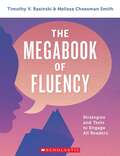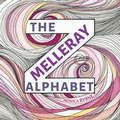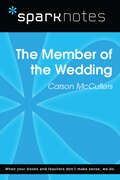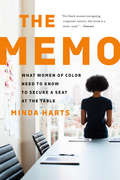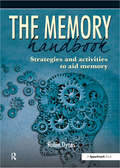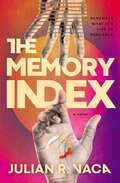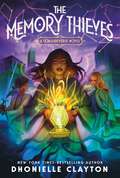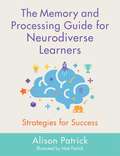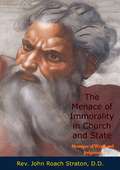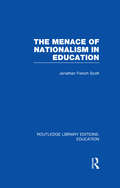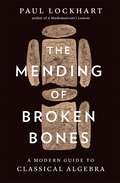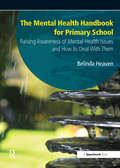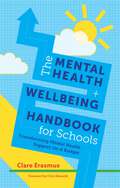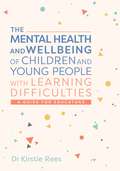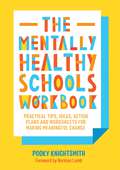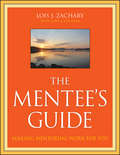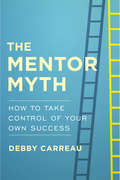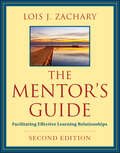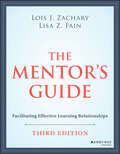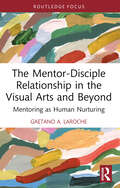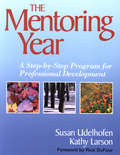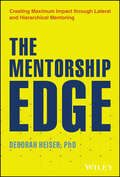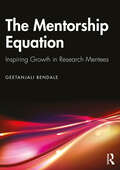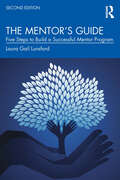- Table View
- List View
The Meeting of Aesthetics and Ethics in the Academy: Challenges for Creative Practice Researchers in Higher Education
by Barbara Bolt Kate MacNeillThe Meeting of Aesthetics and Ethics in the Academy provides a deep understanding of the nuances of ethics in the creative environment and contributes to the critical exploration of the nature of research ethics in higher education. Written by world-renown academics with a wealth of experience in this field, this volume explores ethical challenges and responses across a range of creative practices and disciplines including design, documentary film making, journalism, socially engaged arts and the visual arts. It addresses the complex negotiations that creative practice researchers in higher education undertake to ensure that the ethical compliance required does not undermine the research integrity and artistic aspirations. By presenting carefully considered challenges to accepted models of research, this book illustrates critical analysis through a variety of case studies and anecdotal examples that provide an insight into improved ethics practices and policies in higher education. This book is perfect for academics, ethics administrators, higher degree research candidates and supervisors looking to engage further in creative practice research and wanting to explore and understand its ethical oversight.
The Megabook of Fluency
by Timothy V. Rasinski and Melissa Cheesman SmithFluency expert Timothy V. Rasinski teams up with Melissa Cheesman Smith, a veteran fifth grade teacher, to help teachers effectively weave fluency work into their daily reading instruction. The book is packed with engaging text and tools, an assessment scale, and high quality ready-to-use lessons including text phrasing and tonality, echo reading, word ladders, and more! Given the importance of fluency and its pivotal relationship to comprehension and word recognition the potential is high for improving students overall reading achievement, and their performance in other content areas.
The Melleray Alphabet
by Monica ByrneAn Illuminated Alphabet.Monica Byrne's artfully crafted alphabet gives a whimsical nod to the illuminated manuscripts of ages past. This gorgeous book will take children on an art-filled journey from A to Z. With surprising entries in three languages, children will learn to see their letters--and the world around them--in a brand new light.
The Member of the Wedding (SparkNotes Literature Guide Series)
by SparkNotesThe Member of the Wedding (SparkNotes Literature Guide) by Carson McCullers Making the reading experience fun! Created by Harvard students for students everywhere, SparkNotes is a new breed of study guide: smarter, better, faster. Geared to what today's students need to know, SparkNotes provides: *Chapter-by-chapter analysis *Explanations of key themes, motifs, and symbols *A review quiz and essay topicsLively and accessible, these guides are perfect for late-night studying and writing papers
The Memo: What Women of Color Need to Know to Secure a Seat at the Table
by Minda HartsLean In for women of color: A no-BS look at the odds stacked against women of color in professional settings, from the wage gap to biases and micro-aggressions, with actionable takeawaysThe Memo is the much-needed career advice guide for women of color specifically, finally ending the one-size-fits-all approach of business books that lump together women across races and overlook the unique barriers to success for women of color. In a charismatic and relatable voice, Minda Harts brings her entrepreneurial experience as CEO of The Memo to the page, as well as her past career life as a fundraising consultant to top colleges across the country. With wit and candor, Harts begins by acknowledging the "ugly truths" that keep women of color from getting the proverbial seat at the table in corporate America: micro-aggressions, systemic racism, white privilege, etc. Harts validates that women aren't making up the discrimination they feel, even if it isn't always overt. From there, she gives straight talk on how to address these issues head on, and provides a roadmap to help women of color and their allies make real change to the system. With chapters on network-building, office politics, money and negotiation, The Memo covers all the basics that any good business book should. But through the author's lens, it offers support and long-overdue advice particularly for women of color.
The Memory Handbook: Strategies and Activities to Aid Memory
by Robin DynesThis is a handbook full of practical ideas to use with anyone who is experiencing mild to severe memory difficulties. The suggestions and activities can be used when working with individuals or groups. The strategies can, in fact, be used by anyone young or old, who has become worried about loss of memory. The handbook provides: information about how memory works and different types of memory; an outline of what can affect memory; strategies to aid memory; activities to practice using the strategies; and activities to keep the brain active and maintain memory. The resource is aimed at staff in care environments such as residential homes, day centres, social clubs, support groups, carers or anyone who might be concerned about loss of memory. It promotes understanding about memory difficulties and provides a wide range of strategies and activities to aid response to individual need. Approximately 200pp; A4 wire-o-bound.
The Memory Index (The Memory Index #1)
by Julian Ray VacaIn this electric speculative YA sci/fi novel, the world treats memories like currency, so dreams can be a complicated business. Perfect for fans of Neal Stephenson and Philip K. Dick.In an alternative 1987, a disease ravages human memories. There is no cure, only artificial recall. The lucky ones—the recollectors—need the treatment only once a day.Freya Izquierdo isn&’t lucky. The high school senior is a &“degen&” who needs artificial recall several times a day. Plagued by blinding half-memories that take her to her knees, she&’s desperate to remember everything that will help her investigate her father&’s violent death. When her sleuthing almost lands her in jail, a shadowy school dean selects her to attend his Foxtail Academy, where five hundred students will trial a new tech said to make artificial recall obsolete.She&’s the only degen on campus. Why was she chosen? Freya is nothing like the other students, not even her new friends Ollie, Chase, and the alluring Fletcher Cohen. Definitely not at all like the students who start to vanish, one by one. And nothing like the mysterious Dean Mendelsohn, who has a bunker deep in the woods behind the school.Nothing can prepare Freya and her friends for the truth of what that bunker holds. And what kind of memories she&’ll have to access to survive it.&“Vaca&’s debut is a thrilling and often unsettling examination of the elusive nature of memory and truth. The Memory Index will leave you breathlessly turning pages until its satisfying conclusion.&” —Jonathan Evison, New York Times bestselling author of Small WorldGet hooked on The Memory Index Duology:Book 1: The Memory IndexBook 2: The Recall Paradox (coming Spring 2023)
The Memory Thieves (The Conjureverse Series #2)
by Dhonielle ClaytonThe fantasy adventure sequel to the instant New York Times and #1 Indie Bestseller, The Marvellers by Dhonielle Clayton! Return for Year Two at the global magic school in the sky in The Memory Thieves."The Marvellers deserves the highest compliment I can give a book: I want to live in this world." —Rick Riordan, #1 New York Times bestselling–author Eager to wield their stapiers for Marvel Combat, Ella, Brigit, and Jason are back for their second year at the Arcanum Training Institute. With Ella’s celebrity growing throughout the Marvellian world after thwarting the Ace of Anarchy’s diabolical plans, it’s proving hard for her to focus on her coursework. But back home in New Orleans the Conjure community isn’t too happy about her return to the skies for another year learning to become a Marveller. As if life wasn’t complicated enough, Ella soon discovers more dangerous secrets about the Conjure architect who built the school.Before she can dig deeper, a mysterious magical illness sweeps through the Institute, and Ella lands at the top of the suspect list. Can Ella and her friends save themselves and the Marvellian world before chaos breaks loose?
The Memory and Processing Guide for Neurodiverse Learners: Strategies for Success
by Alison PatrickArmed with the wealth of understanding and strategies in this guide, students will discover how they can learn best, to make studying and revision more effective (and less stressful).Packed with simple, tried and tested strategies and workarounds, this study guide for supporting kids and teens who learn differently (such as those with ADHD, dyslexia, dyspraxia or ASD) explains what memory and processing issues are, and how to work around them. Written by a tutor and specialist with years of experience of working with students with learning differences, this book enables the student to understand the best ways they learn and the reasons behind this. Unpacking processing speed, sensory processing, metacognition, and executive functioning, including working memory, this uniquely relatable and empowering study guide will provide students with the self-understanding they need to manage exams and academic tasks at school with confidence and peace of mind.
The Menace of Immorality in Church and State: Messages of Wrath and Judgment
by John D.“THE following messages are printed in response to many requests for their publication. I have allowed the local coloring to remain in the discourses, because I felt that these elements might add to the vitality of the messages, and make them more concrete and real.“I have not softened the messages, either, by ‘retouching’ them. These messages were stenographically reported, and they are given here just as God gave them to the messenger,—hot from the heart.“Happily, however, we are getting away from that false modesty which is not willing to talk about these evils, in order that they may be exposed and corrected, but is willing to tolerate them in guilty and shameful silence. We need to substitute the challenging tones of truth for this cowardly and prudish reserve. We need to speak out. We need knowledge of these secret enemies of our homes. These evils feed on silence and grow by stealth, and we ought today to tell the whole truth and not compromise with evil. ‘Ye shall know the truth and the truth shall make you free.’ As in Hosea’s day, thousands and tens of thousands are being ‘destroyed for lack of knowledge.’ Men and women, boys and girls,—our children, our brothers and our sisters,—are going down. Surely it is our duty to unmask the sources of their destruction, and to seek by all honest and legitimate means to defend ourselves against these secret assailants of the sanctity of the church, the purity of the home, the good order of the state, and the very life of the nation itself.After every war, there is a wave of immorality. We have just passed through the greatest war of all time, and we are now witnessing the widest wave of immorality in the history of the human race. Like a consuming fire, it is sweeping over the world. Only a spurious and silly optimism can deny this fact. All who really know conditions, both in Europe and America, confirm the fact.”—Rev. John Roach Straton
The Menace of Nationalism in Education (Routledge Library Editions: Education)
by Jonathan Scott FrenchWritten between the two World Wars this volume examines education from the American, British, French & German perspectives and the degree to which the portrayal of those countries in school textbooks contributes to nationalism or world peace.
The Mending of Broken Bones: A Modern Guide to Classical Algebra
by Paul LockhartA joyful and intimate celebration of the beauty and creativity of algebra from one of the foremost math educators of our time.For many of us, algebra conjures up memories of dull classes spent wondering when we’d ever have to solve a system of equations or factor a polynomial. Indeed, most of the time, if we need to plan a budget or figure out how early to leave the house for work, common sense or a quick, seat-of-the-pants approximation is good enough.But as mathematician Paul Lockhart argues in The Mending of Broken Bones, once we stop thinking of algebra in terms of its practical applications, we can appreciate it for the beautiful and gratifying subject that it is. In his hands, algebra is the delicate craft of untangling numerical puzzles to reveal the hidden patterns and often surprising behaviors of the numbers themselves. As Lockhart traverses numerical systems, slips into and out of higher-dimensional space, and delights in the intimate connections between algebra and geometry, we come to see the discipline from his viewpoint: not as the mundane exercises of our school years, but instead as an art form whose beauty lies in its elegant simplicity.Written in Lockhart’s charming and conversational prose, The Mending of Broken Bones is an impassioned and deeply personal celebration of algebra that helps us experience the profound joys of mathematical discovery.
The Mental Health Handbook for Primary School: Raising Awareness of Mental Health Issues and How to Deal with Them
by Belinda HeavenThe stigma attached to mental health and the social barriers that surround it amplify its direct effects and damage the life chances of people with mental health problems. Department of Health (2011) Educating children and young people about mental health is of vital importance if we are to challenge the ignorance and stigma related to this area of health. Many young people will be living in families where an adult member may have mental health problems or indeed may be facing similar problems themselves. This book provides a comprehensive resource to help teachers deal sensitively with this important area. Part One provides an introduction and background information highlighting the need to tackle Mental Health in primary schools. The facts are startling - 10% of 10-16 year olds have a diagnosed mental health disorder, there is an increasing number of children self-harming and an alarming increase in early eating disorders. This section provides clear guidance on how to use the programme, including working with parents and answering questions children may ask. Part Two details a comprehensive PowerPoint presentation introducing staff to the programme. Part Three provides wide-ranging lesson materials with comprehensive teacher notes and including all the necessary copiable resources for using the programme from years 3 through to 6. Part Four has a Glossary of Terms as well as a valuable Resource Directory to direct the busy teacher to other useful sources of information. The accompanying downloadable resources include: activity pages; a model letter for parents; and, staff PowerPoint.
The Mental Health and Wellbeing Handbook for Schools: Transforming Mental Health Support on a Budget
by Clare ErasmusThis book lays out an intuitive and practical approach to mental health and wellbeing that any school can adopt to transform their mental health support for students.With a focus on providing staff with practical tools on a limited budget, the book helps schools make a real difference to student mental health. It sets out a roadmap for staff to create robust mental health support for students without requiring qualifications in psychology or counselling. It covers key areas including staff training, creating safe spaces for wellbeing and how to harness the support of parents and the local community. It also includes practical advice for addressing concerns such as stress, self-harm and body image.From small, everyday improvements that foster a culture of mental wellbeing to whole school campaigns, this book shows how to embed mental health at the heart of a school's philosophy.
The Mental Health and Wellbeing of Children and Young People with Learning Difficulties: A Guide for Educators
by Kirstie ReesKnowing when children and young people are struggling, and identifying the best ways of supporting them is vital. This is all the more important when working with children with varying learning difficulties who may not always be able to communicate their feelings.By demystifying terms such as mental health, wellbeing, learning difficulties and the sensitivities surrounding labels, this practical and evidence-based guide helps you achieve an in-depth understanding of the children and young people you work with. It provides you with skills and knowledge for supporting their mental health and wellbeing in educational settings - from nursery to secondary school in both mainstream and specialist environments with talking and non-verbal communication approaches to accommodate varying needs. Most importantly its holistic approach explores the interaction between the child's learning difficulties and the psychological, social and environmental factors which influence how they manage their ups and downs in life. This lets you think beyond the child and the classroom.
The Mentally Healthy Schools Workbook: Practical Tips, Ideas, Action Plans and Worksheets for Making Meaningful Change
by Pooky KnightsmithThis book is the perfect starting point for anyone looking to promote and encourage mental health in their school, or evaluate their existing provision, in line with current government priorities. It covers not only the day-to-day practical steps you can take to meet the mental health needs of learners, but also a provides a whole bank of ideas for ensuring you adopt a whole-school approach to positive mental health. Pooky Knightsmith lays out tried and tested tools you can use to evaluate the overall mental health of a school, showing how to improve and support the mental health of staff, and how to ensure that the voice of every learner is heard and valued, including the most vulnerable - and that everyone involved with the school feels safe, healthy and happy. Pooky's simple 'litmus test' framework lays out six practical areas you can explore to implement change within your own school, with explanations, sheets to fill in, tips from loads of school staff, and case examples that break these ideas down into easily digestible chunks. This much-needed book is a jumping off point for meaningful change in all aspects of your school community that will promote, support and strengthen mental health at whole-school level.
The Mentee's Guide
by Lois J. Zachary Lory A. FischlerThis volume offers a companion guide to the best-selling book The Mentor's Guide. This practical book offers ideas and suggestions for making the most of a mentoring opportunity for the person being mentored. It shows how to prepare for, sustain, and bring to closure the important mentor/mentee relationship. The author guides mentees through the four phases of the mentoring process and outlines the SMART method (specific, measurable, action-oriented, realistic and timely). The book offers valuable advice for any mentee whether in the nonprofit, corporate, or government sector.
The Mentor Myth: How to Take Control of Your Own Success
by Debby CarreauMentors are over-utilized, under-trained and, as studies show, under-deliver. From an employer's perspective, assigning a mentor is often a band-aid to a larger problem. From an employee's perspective, a lack of formal mentorship is seen as a serious, career-inhibiting problem, the equivalent of sailing a boat without a rudder. In The Mentor Myth, Debby Carreau represents this dichotomy, explaining that while a mentor's counsel can be invaluable, it is not the silver bullet human resources professionals often purport it to be. The opinions of a mentor are one data point, one piece in the much more complex game of navigating a career. In fact, the increasing overreliance on mentorship can actually be a hindrance to a successful career. Instead of continually looking outward for career guidance, aspiring professionals must realize that they possess all the tools necessary to take control of their own careers by using their own strengths, capabilities, and visions of success. Through her years of experience consulting, speaking, and writing about career development, Debby has created a comprehensive, easy-to-implement guide for taking ownership of your professional success. Debby begins by helping the reader create a professional roadmap, including how to build a personal brand, project the right amount of confidence, and manage time. She addresses mentors in the context of networks and sponsors, advising the reader how to incorporate outward influences rather than be defined by them.
The Mentor's Guide
by Lois J. ZacharyThoughtful and rich with advice, The Mentor's Guide explores the critical process of mentoring and presents practical tools for facilitating the experience from beginning to end. Now managers, teachers, and leaders from any career, professional, or educational setting can successfully navigate the learning journey by using the hands-on worksheets and exercises in this unique resource.
The Mentor's Guide: Facilitating Effective Learning Relationships
by Lois J. Zachary Lisa Z. FainExplore the latest edition of an authoritative resource on professional and educational mentoring In the newly revised Third Edition of The Mentor’s Guide: Facilitating Effective Learning Relationships, veteran mentoring experts Lois J. Zachary and Lisa Z. Fain deliver a thoughtful and rich exploration of the critical process of mentoring. The book offers practical tools for facilitating the mentoring experience from beginning to end. In addition to walking you through the four phases of mentoring—preparing, negotiating enabling growth, and coming to closure—this important book provides: Brand-new content on diversity, inclusion, and equity, as well as tools to enhance virtual mentoring relationships The ethics of mentoring, including how to handle common ethical pitfalls and mistakes Hands-on worksheets and exercises to facilitate the mentoring and learning process Perfect for leaders, managers, and educators, in any career or professional setting, The Mentor’s Guide is an indispensable tool to help navigate your learning and mentoring journey.
The Mentor-Disciple Relationship in the Visual Arts and Beyond: Mentoring as Human Nurturing (Routledge Research in Arts Education)
by Gaetano A. LaRocheThis book undertakes a deep examination of mentor and disciple relationships in the development of artists. It draws upon a variety of relationships and models, including an in-person mentor, a mentor or apprentice scenario, and non-physical mentors such as historical figures, in order to investigate their history and philosophy.This volume specifically addresses the role of mentoring in the lives of contemporary aspiring artists, asking if and how mentoring can be considered a form of human nurturance. Deep historical inspections and philosophical inquiries are combined with analyses of interviews with contemporary artists ranging from 35 to 101 years old. These holistic insights present the subject of mentoring in the arts from the multiple angles of art history and relevant ideas about the benefits of nurturance and acceptance in human development.Using artists’ biographies and discussions of their work, this book sheds light on the role that mentoring has played in their development and can play in contemporary education. It will appeal to artists, art history teachers, educators, art students, and art scholars.
The Mentoring Year: A Step-by-Step Program for Professional Development
by Susan K. Udelhofen Kathleen A LarsonOverflowing with checklists, tools, templates, and rubrics for measuring growth toward best practice, this program provides every element needed for first-year induction.
The Mentorship Edge: Creating Maximum Impact through Lateral and Hierarchical Mentoring
by Deborah HeiserLearn how a mentor relationship can make your life more fulfilling The Mentorship Edge: Unlocking Potential, Nurturing Growth, and Creating Explosive Impact explores how we connect to others, feel valued, get pleasure from life, and believe our lives have meaning through forming mentor relationships with others. This book covers traditional hierarchical mentorship we're all familiar with, along with lateral mentoring, where you connect with a friend or colleague—someone you can be vulnerable with—whether they work in your department, another department, or outside of your organization entirely. Insight in this book is drawn from The International Association of Top Professionals 2025 Top CEO and Mentor of the Year Deborah Heiser's experience running The Mentor Project, a nonprofit mentoring organization with more than 100 mentors at the absolute top of their fields. In this book, readers will learn about: The proven benefits of mentorship in both work and home life Mentorship in various fields, including business, research, entrepreneurship, and art Classic examples of the power of mentorship, like when Steve Jobs asked Steve Wozniak for engineering help when he was at Atari The Mentorship Edge is an essential guide to demystify the special concept of mentoring and inspire individuals to engage in mentoring naturally, whether hierarchically or laterally, based on their goals and passions.
The Mentorship Equation: Inspiring Growth in Research Mentees
by Geetanjali BendaleThis textbook navigates through the complex landscape of mentorship in academic research across all levels of education. Delving into the foundational aspects of mentorship, it meticulously outlines historical perspectives, theoretical frameworks, and the essential characteristics of effective mentors and mentees.Through detailed exploration of the mentor–mentee relationship, this book provides insights into building trust, establishing clear expectations, and fostering effective communication strategies. It addresses crucial aspects of mentorship practice, including promoting diversity and inclusivity, ethical considerations, and professional development for mentors. It also explores the vital areas of mental well-being for both mentors and mentees, emphasizing the importance of recognizing signs of mental health challenges and fostering supportive relationships.Enhanced with assessment tools for mentoring effectiveness, appendices, and a wealth of examples, this interdisciplinary volume serves as an indispensable resource for undergraduate and postgraduate students, researchers, educators, and mentors alike. It can be adopted across various streams and departments which includes Management, Psychology, Education, Sociology, Anthropology, and STEM (Science, Technology, Engineering, and Mathematics) research. Its comprehensive approach not only educates but also prepares readers for practical challenges, making it an essential tool for aspiring business managers and corporate leaders from a myriad of industries.
The Mentor’s Guide: Five Steps to Build a Successful Mentor Program
by Laura Gail LunsfordA definitive resource that pulls together evidence from psychology, education, and organizational studies, this fully updated second edition translates research into practice and serves as a practical handbook on how to set up, run, and evaluate any mentoring program. Despite ever-growing interest, there are few helpful resources for program managers and mentoring coordinators. This book sheds needed light on mentoring behaviors, the stages of mentoring, elements of high-quality relationships, and how to recognize and avoid dysfunctional ones. Step-by-step guidance will enable readers to: · Understand what mentoring is (and is not) · Assess their mentoring program using a clear framework · Work through steps to design or redesign an effective mentoring program · Draw on real-world examples to assess and improve programs · Benefit from all-new material for this second edition, including a chapter on e-mentoring and in-depth case studies, as well as updated information on culturally intelligent mentoring and more If you manage or support a mentoring program, then this handbook is for you. Human resource professionals across industries will gain ideas on how to improve the efficiency and effectiveness of mentoring, while administrators in higher education will value the content on formal mentorship programs for faculty members, graduate students, and undergraduates.

